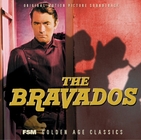|
|
 |
 |
| Return to FSM CDs |
Previous CD | Next CD |
| The Bravados (1958) |
 |
| Music by Hugo Friedhofer, Alfred Newman |
 |
 |
|
|
| Click to enlarge images. |
 |
|
|
| Line: Golden Age |
| CD Release:
September 2001
|
| Catalog #: Vol. 4, No. 13 |
| # of Discs: 1 |
|
 |
The Bravados is a stark and realistic western starring Gregory Peck as a man seeking revenge on a band of outlaws. The film features a powerful and handsome score co-written by two Hollywood greats: Alfred Newman and Hugo Friedhofer. The composers often contributed to each others' scores, just without the fanfare that followed the collaboration between Newman and Bernard Herrmann on The Egyptian. In fact, the score to The Bravados was credited in the film to Lionel Newman, who did not write a note but supervised the score's recording in Germany during a Hollywood musicians strike in 1958 (Bernard Kaun conducted).
The melodic and exciting score for The Bravados features both composers working at the top of their games. The main title theme, "The Hunter," is a driving, quintessential Alfred Newman march which takes melodic and rhythmic western staples to a whole new level. On the other side of the coin, Newman composed the film's love theme and solemn "A Mother's Prayer" material; the 6:17 "The Dead Miner and Emma/Josefa" is the highlight of his contribution, with stirring string passages recalling his masterpiece, The Robe.
The Bravados is a dark and violent film as well as an adventure and Hugo Friedhofer composed the brooding theme for the titular characters. He adapted Newman's march into many of his cues, underscoring the exciting showdowns between Peck's character and the fleeing bandits. Friedhofer keys into the moral ambiguity of the story and his cues are appropriately haunting and dramatic.
FSM's CD restoration is divided into several sections: first is the complete underscore in stereo (minus one cue which was damaged); followed by the film's guitar and church source music; the aforementioned damaged stereo cue; and then a suite of selected cues repeated in mono. The liner notes by longtime film music scholar William H. Rosar delineate the contributions by each composer and shed light on the recording process overseas. The album is a Bravados feast and a fitting tribute to this important score and its two brilliant composers. |
 |
 |
 |
 |
|
 |
|
|
|
|
















